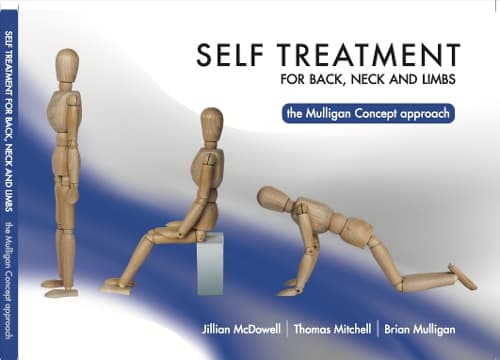
Self Self treatment for back, neck and limbs: the Mulligan Concept approach
Find your copy...
Brian Mulligan qualified as a physiotherapist in New Zealand in 1954. Having travelled widely for many decades teaching his Mulligan Concept to health professionals, he has been recognised internationally for his influence on the field of manual therapy. Researchers have now published hundreds of articles on Mulligan Concept treatments and physiotherapists, osteopaths, chiropractors, and orthopaedic doctors use his treatment techniques around the world. This book has been written to share with the public some of his innovative and certainly useful self-treatments. Updated with the latest advice on posture and safe lifting, it also has management advice on acute injuries and when to seek additional medical help. Simple “pain free” rules are applied to the self-treatments and self-tapings. Many common joint problems are included, from ankles, to elbows, from necks to low backs; so you, the patient can take control and care for your own musculoskeletal injuries and conditions.
About the Author
Jillian McDowell is a New Zealand trained physiotherapist in private practice with 30 years of clinical experience. She has taught acupuncture for 26 years and more recently, for 11 years Mulligan Concept, both nationally and internationally. Previously tagged for both Manipulative Therapy and Acupuncture by the NZ College of Physiotherapy, she completed a master’s degree in Physiotherapy in 2007. As a co-director of a private physiotherapy practice, she works primarily as a full-time clinician, in addition to teaching. She is the current President and Research Officer on the executive of the Physiotherapy Acupuncture Association of New Zealand, works as an auditor for the Physiotherapy Board of New Zealand and an independent consultant for the Health and Disability Commissioner of New Zealand. Jillian is the current International Chair of the Mulligan Concept Teachers Association (MCTA). She has eight journal publications and has contributed to two editions of the Mulligan Concept techniques textbook, including the annotation section. Her areas of interest are adverse reactions to acupuncture and manual therapy, western acupuncture, patient notes and the treatment of pelvic girdle pain and headaches. Thomas Mitchell is a UK physiotherapist with a special interest in the wrist and hand, a private practitioner and first contact practitioner in primary care for the NHS. He has over 20 years of experience in the treatment of musculoskeletal disorders, and worked in the elite sporting environment, notably with GB Boxing, the English Institute of Sports, GB Wheelchair Rugby and Sheffield United Football Club until 2014. He lectures regularly at national and international conferences and for online physiotherapy education, and is research active. Brian Mulligan qualified as a physiotherapist in 1954. He received his Diploma in Manipulative Therapy in 1972. He has been an international lecturer and speaker in the field of manual therapy for over four decades, with many accolades and professional achievement awards. Over the past 35 years he has developed his own concepts and treatments. His approach has spread, and is now being taught in most of the continents. Today he heads his Mulligan Concept Teachers Association. This international association was set up to accredit teachers, by exam, of his concepts and to ensure that his concept courses were of the highest standard. Therapists can now sit a ‘Certified Mulligan Practitioner’ exam (CMP) and those who have passed are listed by country on the web page www.bmulligan.com. He has written his own text-book for therapists called ‘Manual Therapy ‘NAGS’, ‘SNAGs’, ‘MWMs’ etc.’ which is now available in its 7th edition. One of Brian’s key mentors was Freddy Kaltenborn, who taught him to manipulate and mobilise every joint in the body and gave him a ‘prepared mind’ in his field of manual therapy.Brian’s favourite quote comes from Louis Pasteur who said ‘In the field of discovery chance only favours the prepared mind.’ The reader is invited to view Brian Mulligan’s web page, www.bmulligan.com, where references are listed supporting his concepts efficacy.





